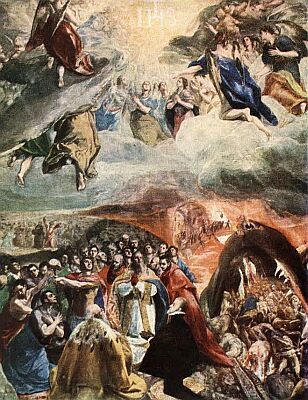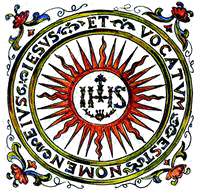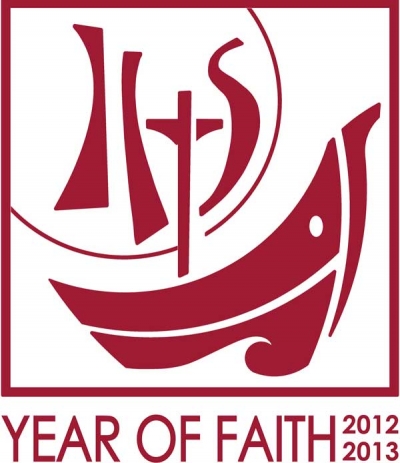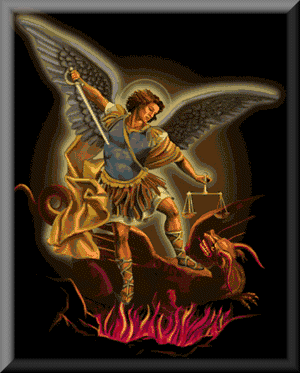From: Hebrews 3:7-14
The Need for Faith; the Bad Example Given by the Chosen People
[7] Therefore, as the Holy Spirit says, “Today, when you hear his voice, [8] do
not harden your hearts as in the rebellion, on the day of testing in the wilderness,
[9] where your fathers put me to the test and saw my works for forty years. [10]
Therefore I was provoked with that generation, and said, ‘They always go astray
in their hearts; they have not known my ways.’ [11] As I swore in my wrath, ‘They
shall never enter my rest.”’ [12] Take care, brethren, lest there be in any of you
an evil, unbelieving heart, leading you to fall away from the living God. [13] But
exhort one another every day, as long as it is called “today”, that none of you
may be hardened by the deceitfulness of sin. [14] For we share in Christ, if only
we hold our first confidence firm to the end.
*********************************************************************************************
Commentary:
7-11. A long quotation from Psalm 95 introduces the theme of that “rest” which
the people of the promise will attain at the end of their wayfaring.
In the Book of Genesis we are told that when God finished his work of creation,
he “rested”. The “rest” prescribed in the Mosaic Law was a kind of imitation of
what God did, sharing God’s happiness, receiving the reward merited by a life
of fidelity and hard work. The Jews had gradually come to a more spiritual under-
standing of “rest” or, as they termed it, “the place of rest”. This idea reaches its
highest form of expression in the apocryphal book of Esdras (IV Esdras), where
the prayer is raised to God to grant the faithful departed “eternal rest”, “Requiem
aeternam dona eis, Domine”. The chosen people were helped to arrive at this
notion of rest by reflecting on the spiritual meaning of the Exodus and the pilgri-
mage to the promised land. The Exodus was also seen as a new creation, with
God “creating” his people. Like the first creation, this second creation would be
followed by “rest”—entry into the promised land. The Epistle to the Hebrews
shares this interpretation of the Exodus but it gives it a Christian perspective by
seeing the Exodus as the Redemption whereby Christ, a new Moses, leads us
to eternal rest.
7. The author of the letter reaffirms that Sacred Scripture—in this case Psalm
95 —is the work of the Holy Spirit. As such it always carries a contemporary
message; it is a form God uses to speak to all men in all periods of history.
Readiness to listen to God and do his will today and now is an important part
of Christian living (cf. 3:13). A Christian should be docile to God speaking in his
heart; he should be quick to respond to all the little invitations God gives him to
deny himself and advance in holiness. No excuse is ever valid for delaying to
give a positive response to grace. “Do your duty ‘now’, without looking back on
‘yesterday’, which has already passed, or worrying over ‘tomorrow’, which may
never come for you” (St. J. Escriva, “The Way”, 253). “Now! Return to your
noble life now. Don’t let yourself be fooled: ‘now’ is not too soon...nor too late”
(”ibid.”, 254).
8. Man is free; he can resist grace, and unfortunately often does. “It is not God’s
goodness that is to blame for faith not coming to birth in men, but the inadequate
dispositions of those who hear the preaching of the word” (St Gregory Nazianzen,
“Oratio Catechetica Magna”, 31). Scripture calls this resistance to grace “hard-
ness of heart” (cf., e.g., Ex 4:21; Rom 9:18; Deut 15:7; Jer 7:26; Acts 19:6).
When withholding belief or resisting conversion, people sometimes claim to have
intellectual difficulties, but, very often, the real problem has to do with their dispo-
sitions, with not “wanting” to respond to grace. The disobedience and “hardness
of heart” or stubbornness of the chosen people is a recurring subject in the Old
Testament (cf., e.g., Ex 32:9; Deut 9:13; 2 Kings 17:14; Is 46:12; Jer 5 :3; Ezek
2:4; etc.). Their rebellion against God’s commands was due to pride, which
turned them into a people whose forehead was as hard as brass, whose neck
was “an iron sinew” (Is 48:4; cf. Acts 7:51), a people uncircumcised in heart,
with uncircumcised ears (cf. Jer 9:26; 6: 10). Conversion cannot operate if some-
one has that attitude. For this reason our Lord, and later his Apostles, referred to
the Jews’ rejection of him, in order to make Christians steadfast in faith (cf. Is 6:9;
Mt 13:13; In 12:40; Acts 28:26).
9. Psalm 95 contains a reference to the Israelites’ rebellion when God put them
to the test in the wilderness. The episode took place in Rephidim, on the border
of the wilderness of Zin, in the south-east of the Sinai peninsula. Having made
their way out of Egypt, the people grew impatient; they complained about how
Yahweh was treating them, and put him to the test by asking him to work a mira-
cle (Ex 17:1-7). God did work a miracle: at Horeb he ordered Moses to strike the
rock with his rod, and out of it flowed water to relieve the people’s thirst. The
place was therefore given the name of Massah (meaning temptation) and Meri-
bah (meaning fault-finding or exasperation). This episode in Jewish history came
to symbolize the disgruntlement which typified the Jews in the desert, an attitude
which even affected Moses in Kadesh (cf. Num 20:1-13). The leader of the chosen
people, in circumstances similar to those of the earlier incident, struck the rock
twice, not expecting anything to happen. On account of this he did not merit to
enter the promised land: he was only allowed to see it from Mount Nebo, where
he died (Deut 34:1-8).0
“Putting God to the test”, “ tempting” him, is a sin of presumption. It involves ex-
posing oneself imprudently and needlessly to physical or spiritual risk from which
God’s ordinary providence does not provide protection (cf. Mt 4:5-7).
In this passage, “putting God to the test” means demanding more proof than
necessary that God is steadfast in his will and continues to protect his chosen
people. “God should not be asked to account for his activities”, St John Chry-
sostom comments; “if one asks him to prove his power, his providence, his soli-
citude, it is the same as not yet being fully convinced of his power and goodness
and mercy” (”Hom. on Heb.”, 6).
11. There are three kinds of rest. The first is the “sabbath”, when God rested
after creating the world; then there is the rest provided by the promised land of
Canaan after countless afflictions and difficulties; and “finally there is the true
rest which belongs to the Kingdom of heaven, where the elect rest from their la-
bors and afflictions: the sabbath is a reflection and symbol of that rest” (”Hom.
on Heb.”, 6).
St Thomas Aquinas applies the term “rest” to peace of body and soul and says
that there are different kinds of peace—physical ease (cf. Lk 12:19); the peace of
conscience a person has who does right in the sight of God; and the peace of
eternal happiness in heaven (cf. “Commentary on Heb, ad loc.”).
12. “Falling away from the living God” seems to be something more serious than
reverting to Judaism; it implies the sad possibility of total loss of belief in God.
Thus, in the case of those to whom the epistle was written, a reversion from the
Gospel to Judaism would not be simply a matter of returning to a previous reli-
gious position but rather a deliberate act involving voluntary resistance to grace
and a complete break with God. For people who had not received the Revelation
of Jesus Christ, the Jewish religion certainly did provide access to God; but for
those who by embracing Christianity had thereby received the fullness of Reve-
lation, renunciation of Christ would mean a virtually irreparable sin (cf. Heb 6:4-6).
There is never a valid excuse for giving up the faith.
The Church teaches and prescribes to its children the need to be true to the faith
even at the cost of life itself. From the very beginning this was the kind of fidelity
practised by the martyrs and confessors of the faith. “They cut our hands off,
they nail us to crosses, they throw us to wild beasts, imprison us and burn us,
and we submit to every kind of torture; yet everyone knows that we do not betray
our faith. Rather, the worse our sufferings, the more there are who embrace faith
and devotion in the name of Jesus (St Justin, “Dialogue with Trypho”, 110,4).
Some Christians today are called to stay true in the face of violent persecution;
they and others also have to overcome fear of ridicule, and the temptation to hide
their convictions from unbelievers. The words of the letter remind us that there is
a danger that whereas in earlier times force failed to achieve its objective, nowa-
days fear of ridicule could cause us to be ashamed of Christ or to deny him.
“’And in a paganized or pagan environment when my life clashes with its surroun-
dings, won’t my naturalness seem artificial?’ you ask me. And I reply: ‘Undoub-
tedly your life will clash with theirs; and that contrast—faith confirmed by works!—
is exactly the naturalness I ask of you” (St. J. Escriva, “The Way”, 380).
13. The more Christians practise charity, the easier it is for them to be steadfast
in the faith. Fraternity, mutual brotherly support, helps provide protection from the
devil’s efforts to make us sin: “’Frater qui adiuvatur a fratre quasi civitas firma”.
Brother helped by brother is a fortress.’ Think for a moment and make up your
mind to live the fraternal spirit that I have always asked of you” (St. J. Escriva,
“The Way”, 460).
Aware of his personal weakness and of the need to help others and to let him-
self be helped, the Christian keeps striving to practise this fraternity. He loves
the good he sees in others, and he tries to uproot in himself and others anything
that implies a defect. Fraternity, therefore, leads to “fraternal correction”, a word
of advice which is always full of understanding, being the outcome of a desire to
live in harmony with others and to remove divisions and barriers. Christian frater-
nity binds the Church together.
“Not in vain is there in the depths of man’s being a strong longing for peace, for
union with his fellow man, for mutual respect for personal rights, so strong that
it seeks to transform human relations into fraternity. This longing reflects some-
thing which is most deeply imprinted upon our human condition: since we are all
children of God, our fraternity is not a cliche or an empty dream; it beckons as a
goal which, though difficult, is really ours to achieve” (St. J. Escriva, “Friends of
God”, 233).
14. This is a repetition of the exhortation in v. 6 to remain true to the end. “Firm
confidence’’ is the very opposite of the “falling away” mentioned in v. 12. From
the very beginning of his calling, a Christian is already sharing in Christ’s life and
in his glory, but he will not share in it fully until after death, when he will be able
actually to see the Lord.
This sharing in Christ’s grace is a treasure which we carry in “earthen vessels”
(2 Cor 4:7) and can lose at any time through sin. We need to nurture this grace
and protect our faith by being watchful and active right through our life: “We have
shared in Christ’s death through holy Baptism and we have been buried with him;
we have shared in his resurrection provided we keep our faith intact” (Theodoret
of Cyrus, “Interpretatio Ep. ad Haebreos”, III).
The Christian life is a matter of constantly returning to God, beginning anew, and
humbly and decisively correcting our course when we go astray through weak-
ness or indifference.
“What does it matter that we stumble on the way, if we find in the pain of our fall
the energy to pick ourselves up and go on with renewed vigor? Don’t forget that
the saint is not the person who never falls, but rather the one who never fails to
get up again, humbly and with a holy stubbornness. If the Book of Proverbs says
that the just man falls seven times a day (cf. Prov 24:16), who are we poor crea-
tures, you and I, to be surprised or discouraged by our own weaknesses and falls!
We will be able to keep going ahead, if only we seek our fortitude in him who says:
‘Come to me, all you who labor and are heavy laden and I will give you rest’ (Mt
11:28). Thank you, Lord, “quia tu es, Deus, fortitudo mea” (Ps 42:2), because
you, and you alone, my God, have always been my strength, my refuge and my
support” (St. J. Escriva, “Friends of God”, 131).
*********************************************************************************************
Source: “The Navarre Bible: Text and Commentaries”. Biblical text from the
Revised Standard Version and New Vulgate. Commentaries by members of
the Faculty of Theology, University of Navarre, Spain.
Published by Four Courts Press, Kill Lane, Blackrock, Co. Dublin, Ireland, and
by Scepter Publishers in the United States.
From: Mark 1:40-45
The Curing of a Leper
[40] And a leper came to Him (Jesus), beseeching Him, and kneeling said to
Him, “If You will, You can make me clean.” [41] Moved with pity, He stretched
out His hand and touched him, and said to him, “I will; be clean.” [42] And im-
mediately the leprosy left him, and he was made clean. [43] And He sternly
charged him, and sent him away at once, [44] and said to him, “See that you
say nothing to anyone; but go, show yourself to the priest, and offer for your
cleansing what Moses commanded, for a proof to the people.” [45] But he went
out and began to talk freely about it, and spread the news, so that Jesus could
no longer openly enter a town, but was out in the country; and people came to
Him from every quarter.
*********************************************************************************************
Commentary:
40-44. Leprosy was seen as a punishment from God (cf. Numbers 12:10-15). The
disappearance of the disease was regarded as one of the blessings of the messia-
nic times (Isaiah 35:8; cf. Matthew 11:5; Luke 7:22). Because leprosy was conta-
gious, the Law declared that lepers were impure and that they transmitted impuri-
ty to those who touched them and to places they entered. Therefore, they had to
live apart (Numbers 5:2; 12:14ff) and to show that they were lepers by certain ex-
ternal signs. On the rite of purification, see the note on Matthew 8:4.
[The note on Matthew 8:4 states:
4. According to the Law of Moses (Leviticus 14), if a leper is cured of his disease,
e should present himself to a priest, who will register the cure and give him a cer-
tificate which he needs to be reintegrated into the civil and religious life of Israel.
Leviticus also prescribes the purifications and sacrifice he should offer. Jesus’s
instruction to the leper is, then, in keeping with the normal way of fulfilling what
the laws laid down.]
The passage shows us the faithful and confident prayer of a man needing Jesus’s
help and begging Him for it, confident that, if Our Lord wishes, He can free him
from the disease (cf. Matthew 8:2). “This man prostrated himself on the ground,
as a sign of humility and shame, to teach each of us to be ashamed of the stains
of his life. But shame should not prevent us from confessing: the leper showed
his wound and begged for healing. If You will, he says, You can make me clean;
that is, he recognized that the Lord had the power to cure him” (St. Bede, “In
Marci Evangelium Expositio, in loc.”).
On the discretion and prudence Jesus required regarding His person, see the
note on Mark 1:34 and Matthew 9:30.
[The note on Mark 1:34 states:
34. Demons possess a supernatural type of knowledge and therefore they recog-
nize Jesus as the Messiah (Mark 1:24). Through the people they possess they
are able to publish this fact. But Our Lord, using His divine powers, orders them
to be silent. On other occasions He also silences His disciples (Mark 8:30; 9:9),
and He instructs people whom He has cured not to talk about their cure (Mark 1:
4; 5:43; 7:36; 8:26). He may have acted in this way to educate the people away
from a too human and political idea of the Messiah (Matthew 9:30). Therefore,
He first awakens their interest by performing miracles and gradually, through His
preaching, gives them a clearer understanding of the kind of Messiah He is.
Some Fathers of the Church point out that Jesus does not want to accept, in
support of the truth, the testimony of him who is the father of lies.]
[The note on Matthew 9:30 states:
30. Why did our Lord not want them to publicize the miracle? Because His plan
was to gradually manifest Himself as the Messiah, the Son of God. He did not
want to anticipate events which would occur in their own good time; nor did He
want the crowd to start hailing Him as Messiah King, because their notion of
messiah was nationalistic, not a spiritual one. However, the crowd did in fact pro-
claim Him when he worked the miracles of the loaves and the fish (John 6:14-15):
“When the people saw the sign which He had done, they said, ‘This is indeed
the prophet who is to come into the world!’ Perceiving then that they were about
to come and take Him by force to make Him king, Jesus withdrew again to the
hills by Himself.”]
*********************************************************************************************
Source: “The Navarre Bible: Text and Commentaries”. Biblical text from the
Revised Standard Version and New Vulgate. Commentaries by members of
the Faculty of Theology, University of Navarre, Spain.
Published by Four Courts Press, Kill Lane, Blackrock, Co. Dublin, Ireland, and
by Scepter Publishers in the United States.
Feast of
the Holy Name of Jesus

Luke 2:21 "...Et vocatum est Nomen eius IESUS"
("And His Name was called JESUS")
Psalm 90:14 "Because he hoped in me I will deliver him:
I will protect him because he hath known My Name."
Zacharias 10:12 "I will strengthen them in the Lord,
and they shall walk in His Name, saith the Lord."
Apocalypse 3:8 "I know thy works. Behold, I have given before thee a door opened, which no man can shut: because thou hast a little strength, and hast kept my word, and hast not denied My Name."
Apocalypse 15:4 "Who shall not fear Thee, O Lord, and magnify Thy Name?..."
Blessed be the most holy Name of Jesus without end!
January Devotion: The Holy Name of Jesus
The month of January is traditionally dedicated to the Holy Name of Jesus. This feast is also celebrated on January 3. Here is an explanation of the devotion.
Since the 16th century Catholic piety has associated entire months to special devotions. The devotion to the Holy Name of Jesus has been traditionally associated with the month of January, due to its celebration on January 3. The name Jesus was given to the Holy Child at God's command (Luke 1:31). The Holy Name is all-powerful because of the Person who bears it; we honor it because of the command of Christ, that we should pray in His Name and because it reminds us of all the blessings we receive through our Holy Redeemer. Hence St. Paul was able to write to the Philippians: ". . . at the name of Jesus every knee should bend of those in heaven, on earth, and under the earth" (Phil. 2:10). By means of this devotion we also make amends for improper use of the Holy Name.
Prayer Source: Prayer Book, The by Reverend John P. O'Connell, M.A., S.T.D. and Jex Martin, M.A., The Catholic Press, Inc., Chicago, Illinois, 1954
Prayer/Hymn in Honor of the Most Holy Name of Jesus - Iesu, Dulcis Memoria
Iesu, Dulcis Memoria is a celebrated 12th century hymn attributed to St. Bernard of Clairvaux (1090-1153), Doctor Mellifluus. The entire hymn has some 42 to 53 stanzas depending upon the manuscript. Parts of this hymn were used for the Feast of the Holy Name of Jesus, which was formerly celebrated on the Sunday between the Circumcision and Epiphany, or failing such a Sunday, on January 2. The part below was used at Vespers. In the liturgical revisions of Vatican II, the feast was deleted, though a votive Mass to the Holy Name of Jesus had been retained for devotional use. With the release of the revised Roman Missal in March 2002, the feast was restored as an optional memorial on January 3.
Jesus, the very thought of Thee
With sweetness fills the breast!
Yet sweeter far Thy face to see
And in Thy presence rest.
No voice can sing, no heart can frame,
Nor can the memory find,
A sweeter sound than Jesus' name,
The Savior of mankind.
O hope of every contrite heart!
0 joy of all the meek!
To those who fall, how kind Thou art!
How good to those who seek!
But what to those who find? Ah! this
Nor tongue nor pen can show
The love of Jesus, what it is,
None but His loved ones know.
Jesus! our only hope be Thou,
As Thou our prize shalt be;
In Thee be all our glory now,
And through eternity. Amen.
---Roman Breviary
Prayer Source: Prayer Book, The by Reverend John P. O'Connell, M.A., S.T.D. and Jex Martin, M.A., The Catholic Press, Inc., Chicago, Illinois, 1954
O Divine Jesus, Thou hast promised that anything we ask of the Eternal Father in Thy name shall be granted.
O Eternal Father. In the name of Jesus, for the love of Jesus, in fulfillment of this promise, and because Jesus has said it, grant us our petitions for the sake of Jesus, Thy Divine Son. Amen.
Prayer Source: Prayer Book, The by Reverend John P. O'Connell, M.A., S.T.D. and Jex Martin, M.A., The Catholic Press, Inc., Chicago, Illinois, 1954
That at the name of Jesus every knee should bend, of those that are in heaven, on earth, and under the earth, and every tongue confess that Jesus Christ is Lord, to the glory of God the Father.
Phil:2:10-11

Litany Of The Holy Name of Jesus
Feast of the Holy Name of Jesus
Jesus, The Name above all Names
Devotion to the Holy Name (of Jesus) [Catholic Caucus]
Lessons In Iconography : The Chi Rho - Christ
St. Francis de Sales on the Most Holy Name of Jesus (Excerpt from a Sermon) (Catholic Caucus)
St. Francis de Sales on the Most Holy Name of Jesus (Catholic/Orthodox Caucus)
St. Bernard on the Most Holy Name of Jesus [Ecumenical]
Saving the day in His Holy Name: St. Genevieve gets a reprieve [Catholic Caucus]
The Holy Name of Jesus
Holy Name of Jesus [San Bernadino of Siena] Ecumenical
The Holy Name of Jesus
Devotion to the Holy Name [of Jesus]
The Name of Jesus: Its Power in Our Lives
The Holy Name of Jesus
Devotion to the Holy Name of Jesus
The Holy Name of Jesus

 The following is the longer version of the vital prayer composed by Pope Leo XIII in 1888 after his startling vision as to the future of the Church. This prayer was dedicated for the Feast of St. Michael 1448 years from the date of the election of the first Leo - Pope Saint Leo the Great. Everyone is familiar with the first prayer below which was mandated by His Holiness as part of the Leonine Prayers after Low Mass. Below are both the short and longer versions of this poignant prayer which should never be forgotten.
The following is the longer version of the vital prayer composed by Pope Leo XIII in 1888 after his startling vision as to the future of the Church. This prayer was dedicated for the Feast of St. Michael 1448 years from the date of the election of the first Leo - Pope Saint Leo the Great. Everyone is familiar with the first prayer below which was mandated by His Holiness as part of the Leonine Prayers after Low Mass. Below are both the short and longer versions of this poignant prayer which should never be forgotten. 
 Look down upon me, O good and gentle Jesus, while before Thy face I humbly kneel, and with burning soul pray and beseech Thee to fix deep in my heart lively sentiments of faith, hope and charity, true contrition for my sins, and a firm purpose of amendment; the while I contemplate with great love and tender pity Thy five most precious wounds, pondering over them within me, calling to mind the words which David Thy prophet said of Thee, my good Jesus: "They have pierced My hands and My feet; they have numbered all My bones."
Look down upon me, O good and gentle Jesus, while before Thy face I humbly kneel, and with burning soul pray and beseech Thee to fix deep in my heart lively sentiments of faith, hope and charity, true contrition for my sins, and a firm purpose of amendment; the while I contemplate with great love and tender pity Thy five most precious wounds, pondering over them within me, calling to mind the words which David Thy prophet said of Thee, my good Jesus: "They have pierced My hands and My feet; they have numbered all My bones." 





